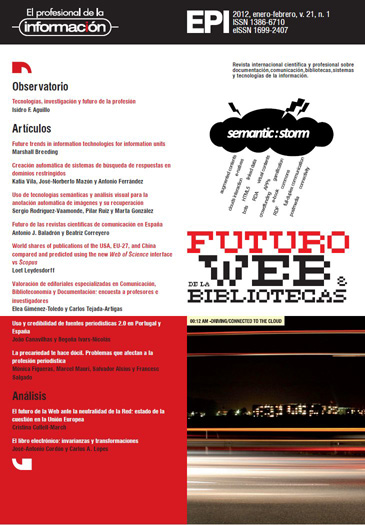Current and future trends in information technologies for information units
DOI:
https://doi.org/10.3145/epi.2012.ene.02Keywords:
Libraries, Library management systems, Integrated library systems, Web based services, Infrastructure, Digital collections, Digitization, Library collections, Discovery software, eBooks, eJournals, Software as a service, Cloud computing.Abstract
With the increasing dominance of electronic content and digital collections in academic libraries, the capabilities lacking in the current slate of automation systems has increasingly become an obstacle to progress. A new generation of digital services platforms for libraries is emerging, designed to provide a more comprehensive approach to the management and access to all formats of library materials: print, electronic and digital. These new systems involve a modernization of technology, embracing service-oriented architectures, availability for APIs to facilitate interoperability with external systems, support for task workflows more aligned with current operational realities, and more tightly coupled discovery interfaces that deliver access to library collections and services in a more unified and comprehensive manner. These new products, emerging in this era of cloud computing, have been designed for deployment through software as a service and rely on highly shared data models.
Downloads
Downloads
Published
How to Cite
Issue
Section
License
Dissemination conditions of the articles once they are published
Authors can freely disseminate their articles on websites, social networks and repositories
However, the following conditions must be respected:
- Only the editorial version should be made public. Please do not publish preprints, postprints or proofs.
- Along with this copy, a specific mention of the publication in which the text has appeared must be included, also adding a clickable link to the URL: http://www.profesionaldelainformacion.com
- Only the final editorial version should be made public. Please do not publish preprints, postprints or proofs.
- Along with that copy, a specific mention of the publication in which the text has appeared must be included, also adding a clickable link to the URL: http://revista.profesionaldelainformacion.com
Profesional de la información journal offers the articles in open access with a Creative Commons BY license.




